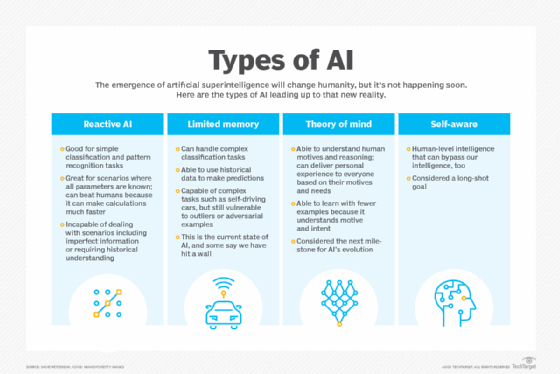As organizations increase their use of artificial intelligence technology in their operations, they are reaping tangible benefits that are expected to deliver significant financial value.
Eighty-seven percent of organizations believe AI and machine learning will help them grow revenue, increase operational efficiency and improve customer experiences, according to research firm Frost & Sullivan’s “Global State of AI, 2022” report.
These are just a few of the benefits that AI can deliver.
Here are 12 benefits that the technology brings to organizations in various industry sectors.
1. Better decisions
Organizations are increasingly using AI to gain insights into their data or, in today’s business parlance, to make “data-driven decisions.” As they do so, they find that they are indeed making better, more accurate decisions instead of decisions based on individual instincts or intuition tainted by personal biases and preferences.
For example, Kavita Ganesan, an AI advisor, strategist and founder of the consultancy Opinosis Analytics, pointed to one company that used AI to help it sort through the survey responses of its 42,000 employees. The technology analyzed narrative responses and presented summarized findings—an approach that effectively allowed company officials to understand what workers most wanted rather than offering them options to sort through boxed choices.
2. Efficiency and productivity gains
Efficiency and productivity gains are two other major benefits organizations get from using AI, said Adnan Masood, chief AI architect at UST, a digital transformation solutions company.
Masood said AI allows organizations to handle tasks at a volume and speed that simply cannot be matched by humans — whether they’re using AI for search or analyzing data for insights, creating software code or outlining specific business processes. to feed.
Not only does AI operate at a scale beyond human capacity, Masood noted, but it removes time-consuming manual tasks from workers—a productivity gain that allows workers to perform higher-level tasks that only humans can do. He pointed to the use of AI in software development as an example, highlighting the fact that AI can create test data to check code, freeing developers to focus on more engaging work.
This allows organizations to reduce the costs associated with performing mundane, repeatable tasks that can be performed by technology, while maximizing the talent of their human capital.
Here are the main benefits that AI brings to businesses.
3. Improved speed of business
As fast as business is moving in this digital age, AI is helping it move even faster, said Seth Earley, author of The AI-Powered Enterprise and CEO of Earley Information Science. “It’s all about speeding up the clock of the business,” he said. AI essentially enables shorter cycles and reduces the time it takes to move from one stage to the next — such as from design to commercialization — and that shortened timeline, in turn, yields better and more immediate ROI.
4. New capabilities and business model expansion
Managers can use AI for business model expansion, experts said, noting that organizations are seeing new opportunities as they deploy data, analytics and intelligence across the enterprise.
For example, autonomous vehicle companies can use the trove of data they collect to identify new revenue streams related to insurance, while an insurance company can apply AI to its big data stores to get at fleet management.
5. Personalized customer services and experiences
AI analyzes and learns from data to create highly personalized and tailored experiences and services, said Brian Jackson, principal research director at Info-Tech Research Group.
He said the most visible examples of this come from the consumer world, as streaming services, such as Netflix, and retailers use intelligent systems to study buying patterns, individual consumer data and larger datasets to determine what each customer prefers at any given time to match their personal needs. style, interests and needs.
However, AI delivers that personalization in numerous other areas, such as in healthcare, where it adapts treatments, and in work environments to support an employee’s individual requirements.

6. Enhanced Services
AI creates interactions with technology that are easier, more intuitive, more accurate and therefore better all around, said Mike Mason, chief AI officer at Thoughtworks.
He cited a real estate website that uses generative AI to allow users to refine their property listing searches through conversational queries rather than clicking through boxes.
“The AI understands an unstructured query, and it understands unstructured data,” Mason explained. In other words, the technology can analyze a user’s request even when it is given in plain, conversational language; analyze all the descriptive elements within each listing, including narrative notes added by real estate agents; and provides the user with a finely tuned and highly accurate list of properties that meet their requirements.
7. Improved monitoring
AI’s ability to ingest and process massive amounts of data in real time means organizations can implement near-instantaneous monitoring capabilities to alert them to issues, recommend actions and, in some cases, initiate a response, according to experts.
For example, AI can use information collected by devices on factory equipment to identify problems and predict needed maintenance. This prevents disruptive breakdowns and expensive maintenance work that is carried out because it is needed rather than scheduled.
AI’s monitoring capabilities can be effective in other areas, such as in cyber security operations in enterprises where large amounts of data need to be analyzed and understood.
8. Better quality and reduction of human error
Organizations can expect a reduction in errors and stronger adherence to established standards when they add AI technology to processes. Furthermore, when AI and machine learning are integrated with a technology such as robotic process automation, which automates repetitive, rule-based tasks, the combination not only speeds up processes and reduces errors, but can also be trained to improve and tackle itself. broader tasks.
Because of that error reduction and higher quality, “AI improves the value proposition[osition]Earley said.
Using AI in financial reconciliation, for example, almost always produces error-free results, while that same reconciliation when handled, even partially, by human employees, is prone to error.
9. Better talent management
Companies are using AI to improve many aspects of talent management, from streamlining the hiring process to eradicating bias in corporate communications. Additionally, AI-enabled processes not only save companies in hiring costs, but can also impact workforce productivity through the successful acquisition, screening and identification of top-level candidates. As natural language processing tools have improved, companies are also using chatbots to provide job candidates with a personalized experience and to mentor employees. In addition, AI tools can measure employee sentiment, identify and retain high performers, determine fair pay, and deliver more personalized and engaging workplace experiences with less requirement for boring, repetitive tasks.
10. More innovation
As workers at all levels become more comfortable and confident working with AI, experts said they are starting to use AI tools to help them be more creative and more innovative.
In her book, Ganesan described how a restaurant chain used the technology to power a mobile app that allows customers to create their own cocktails based on their mood and food choices, using the tool to compile the recipe and it then sent to a human bartender to mix and serve.
Other industries are using AI to support R&D activities, such as in the healthcare space for drug discovery and the consumer goods sector for new product creation.
11. Increased profitability
As they use AI in more areas of the enterprise – from personalizing services to assisting with risk management to supporting innovation – organizations will see improved productivity, reduced costs, higher efficiency and potentially new growth opportunities.
Taken together, this can deliver greater profitability, said Sreekar Krishna, US leader of AI at professional services firm KPMG. “On the revenue side, the potential is exponential: you can keep growing as long as you bring value to customers.”
12. Industry Specific Improvements
In addition to the benefits listed above, AI can fuel the following industry-specific improvements:
Retailers can use AI to better target their marketing efforts, develop a more efficient supply chain and better calculate prices for optimal returns. At retail companies, AI helps predict customer requirements and appropriate staffing levels. The pharmaceutical sector can use the technology to perform drug discovery data analysis and predictions that cannot be done with conventional technology. The financial industry can use AI to strengthen its efforts to detect fraud.
It’s important to remember that as companies find ways to use AI for competitive advantage, they also grapple with challenges. Concerns include AI bias, government regulation of AI, management of the data needed for machine learning projects and talent shortages. Additionally, financial gains can be elusive if the talent and infrastructure for implementing AI is not in place.
Disclaimer for Uncirculars, with a Touch of Personality:
While we love diving into the exciting world of crypto here at Uncirculars, remember that this post, and all our content, is purely for your information and exploration. Think of it as your crypto compass, pointing you in the right direction to do your own research and make informed decisions.
No legal, tax, investment, or financial advice should be inferred from these pixels. We’re not fortune tellers or stockbrokers, just passionate crypto enthusiasts sharing our knowledge.
And just like that rollercoaster ride in your favorite DeFi protocol, past performance isn’t a guarantee of future thrills. The value of crypto assets can be as unpredictable as a moon landing, so buckle up and do your due diligence before taking the plunge.
Ultimately, any crypto adventure you embark on is yours alone. We’re just happy to be your crypto companion, cheering you on from the sidelines (and maybe sharing some snacks along the way). So research, explore, and remember, with a little knowledge and a lot of curiosity, you can navigate the crypto cosmos like a pro!
UnCirculars – Cutting through the noise, delivering unbiased crypto news















